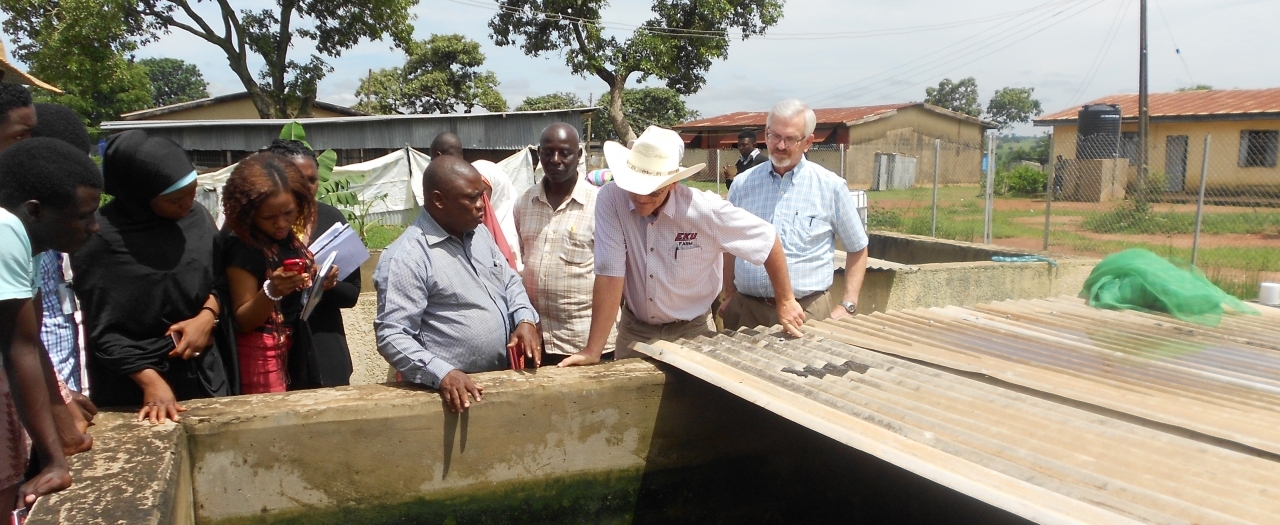By ZEYNAB DAY
Student Writer, EKU Communications & Marketing
Students arose from mattresses on the floor, exited their windowless dormitories, grabbed their tattered notebooks and piled into dark and dusty classrooms at a rural African agriculture college where an Eastern Kentucky University faculty member volunteered this summer.
EKU Meadowbrook Farm Director Rick Griebenow’s visit emphasized the different challenges faced by educational facilities in countries like Nigeria where students and faculty are driven to succeed but are limited by a lack of functioning equipment, water shortages and power outages.
Griebenow volunteered for the Farmer-to-Farmer program and was assigned to help evaluate the needs of Ahmabu Bello University’s College of Agriculture and Animal Science branch in Mando, in rural Nigeria. He evaluated the College’s curriculum, faculty, staff, farm infrastructure and campus housing during his two-week stay. Griebenow and fellow volunteer David Lawver, professor of agriculture at Texas Tech University, spent a number of days at the College assessing needs and talking to faculty, staff and alumni.
Most of the farm’s infrastructure was more than 50 years old. Despite attempts by faculty and students to maintain the grounds, most buildings and equipment were in disrepair due to weathering. Basic necessities such as food, water and fuel were scarce, said Griebenow.
“Coming back I appreciate what we (Meadowbrook Farm) have a whole lot more,” said Griebenow. “We have an incredible amount of infrastructure, electricity, water and supplies.”
Some of the problems facing the College of Agriculture and Animal Science in Mando could be resolved by on-campus renovations, while others stem from regional issues such as limited fuel resources. Griebenow witnessed long lines for gas, and highways were littered with abandoned vehicles due to fuel shortages. Farming equipment at the College could not be operated due to shortages, so most work was done manually, Griebenow said.
“For the first full week I stood around with my jaw dropped because there was heavy equipment everywhere you looked and people were pushing and pulling wheel barrels and carrying everything by hand,” Griebenow said.
During his stay in Mando, Griebenow also witnessed regular power outages and water shortages. He said outages were so frequent that “it would be difficult for anyone to watch a two-hour movie without the power going out.”
Students often worked in dark classrooms because of the power outages and most of the work was completed with pen and paper, as outages made it difficult to use the computers, Griebenow said.
“They had an internet café but have not had access to the internet for more than 18 months.” he said.
The College is a key source of education for farmers and business people in the region, and more than 500 students enroll each year.
The unemployment rate is more than 40 percent for youth in the Mando region. Education is an asset to members of the Mando community and the College’s service region because the dollar value for labor in Nigeria is very low. “Everybody is trying to bootstrap up,” Griebenow said.
Most individuals seek government jobs, but those are limited, leading many people to start their own business. The College helps cultivate the expertise small business owners need by providing public classes focusing on trades such as masonry, electrical wiring, welding, plumbing and carpentry. The evaluation completed by Griebenow will help keep such programs alive by attracting funding from both national and international aid resources.
Griebenow and Lawver completed a presentation for the provost and other administrators at Mando. The report evaluated the needs of the Mando branch and covered what steps need to be taken to help both faculty and students at the farm. The presentation will also be used by Ahmandu Bello as a “push-off point” to secure outside subsides to improve the quality of education and functionality at the Mando branch, Griebenow said.
“This (report) will help administrators to identify what type of help they can glean from USAID and start to patch up some of the holes,” Griebenow said.
Griebenow said he first heard about Farmer-To-Farmer in 2012 and applied to volunteer in the past but scheduling conflicts prevented him from accepting invitations. His trip was funded, in part, by Winrock International, one of many companies that help provide funding for USAID programs such as Farmer-to-Farmer.
The Farmer-To-Farmer Program is a volunteer program that helps to bring knowledge and expertise from agriculture professionals in the United States to countries around the globe. It was established as part of the 1985 Farm Bill and was designed to promote international agricultural development through educational initiatives.
